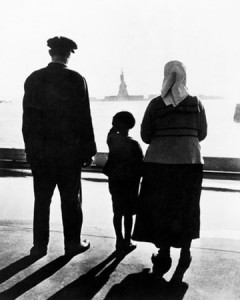 No, not that kind of immigrant. Len Sweet has used the immigrant/native relationship to describe cultural shifts. Even though some of us would be considered native to the United States, we may well be like immigrants in an “Information Age” were our skills hone in the “Industrial Age.” Or, if you consider Doug Pagitt’s descriptor for the current era, “The Inventive Age,” more of us may be immigrants than we may like to admit.
No, not that kind of immigrant. Len Sweet has used the immigrant/native relationship to describe cultural shifts. Even though some of us would be considered native to the United States, we may well be like immigrants in an “Information Age” were our skills hone in the “Industrial Age.” Or, if you consider Doug Pagitt’s descriptor for the current era, “The Inventive Age,” more of us may be immigrants than we may like to admit.
Youth Culture can hardly be considered monolithic since there are vast nuances among youth cultures spanning social spheres, economic considerations, and ethnic diversity. But, we may consider Youth Culture to categorically describe teenagers and common experiences related to the varied stages of adolescence.
Mark Riddle consults with churches as they consider their relationship to Youth Culture, youth cultures, and how they intersect with the Church/church. Our conversations over the past ten years have pointed up two things. First, there are some aspects of Youth Culture that are like the Preacher in Ecclesiastes notes, “There is nothing new under the sun.” Second. there are some aspects of Youth Culture that are indeed new under the sun. And, the real issue may be that teens face the same developmental stages but do so in significantly different eras, epochs, or periods.
That being said, anyone who undertakes to consider Youth Culture, youth cultures, and the lives of teens who has himself or herself passed that era and age could well be deemed an “immigrant.” Our conversations would be akin to natives and immigrants attempting to know one another. There is certain suspicion. You can be sure underneath any suspicion lies a great deal of curiosity.
What’s more, when these immigrants and natives begin to share a conversation sometimes the occasion reveals a native depression that triggers in the immigrant a need to offer a sense of hopefulness. After all, in this parlance, the immigrant was once a native. They may share different cultural trappings. But, in the end the immigrant survived his or her era and wants to assure the young native he or she will too.
The nexus for this series of posts came in an invitation to speak for the second year to a group of people who work with youth who often face depression and thoughts of suicide. Wednesday of this week, I shared for an hour from the perspective of a former Youth Pastor and current Senior Pastor, though I prefer simply, Pastor Todd.
The title for my talk was, “Ms. Trunchbull, Facebook, and Referentialism: Thoughts on Teen Depression and Suicide from an Immigrant.” Underneath the attempt at creativity lies some considerations of how religion, and in particular Christianity, may contribute to these experiences and at the same time, may indeed offer hope.
Todd, yesterday I spoke with a co-worker about the uniqueness of what we call “adolescence.” Perhaps the Jewish culture is on to something with a ceremony to declare an adult at the age of 13.
I wonder if we haven’t helped foster confusion by identifying a stage that is neither child nor adult.
Open to feedback on this.
Frank, Youth Culture should probably be distinguished from adolescence insofar as what they represent. Adolescence tends to describe a developmental stage bridging child and adult primarily expressed in Western Culture. Youth Culture has more to do with a market niche growing after WW2 and following on or triggered by cultural events dating to the 60’s. The intersection of the two, as I see it, works in reverse. That is, now that You Culture is an established market, forces have worked to prolong this period to gain access to more dollars. The result has been an elongation of adolescence. Riddle contends from his research that we now witness early/middle/late adolescence. Thus, while Youth Culture may represent a wide swath of our population matrix, there are within that broad group smaller niches that have also become sub-market niches.
As to Jewish culture and a rite of passage. Yes and no. Yes, that we would do well to help youth into adulthood with greater encouragement and support. No, in the sense that it would require owe Western sensibilities to undergo some moves too radical for most.